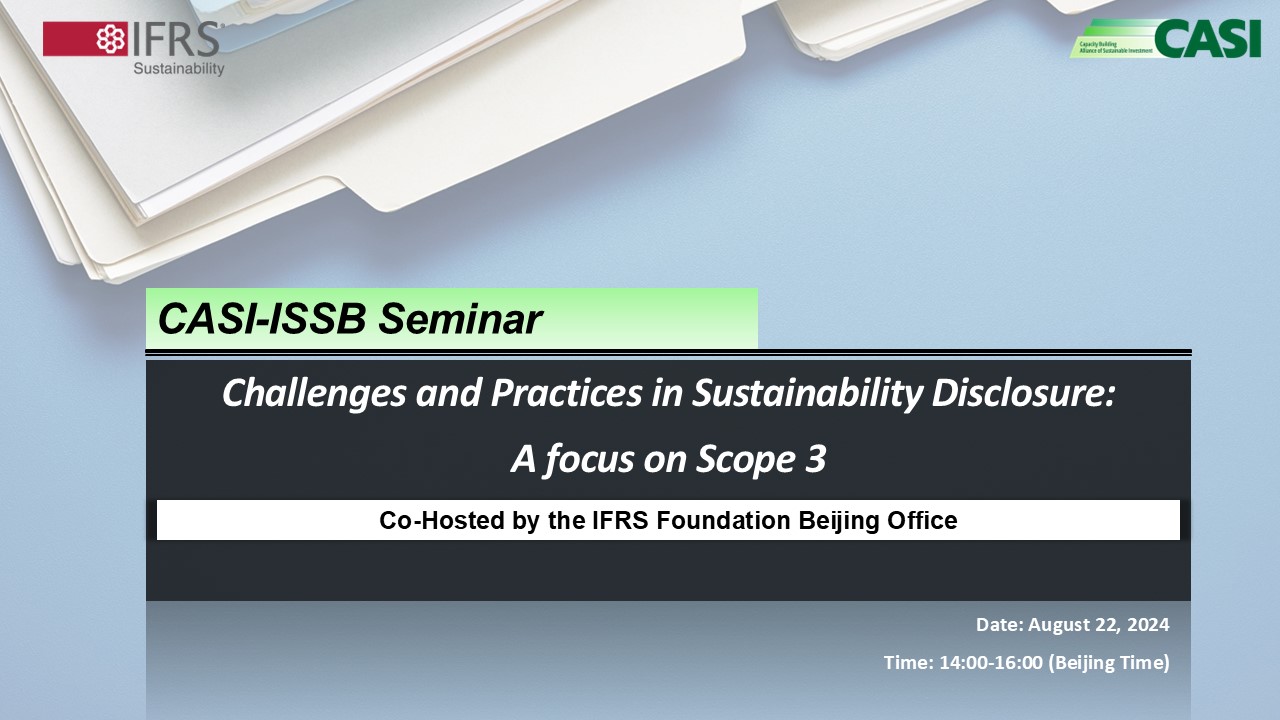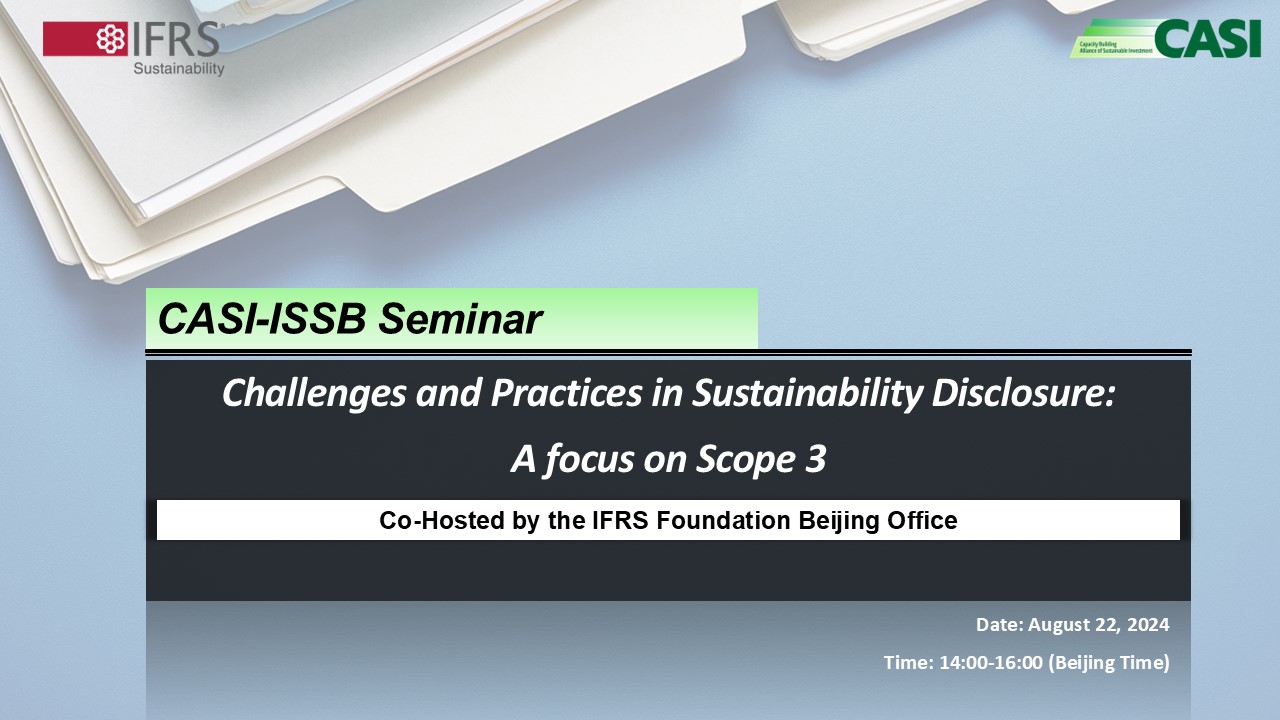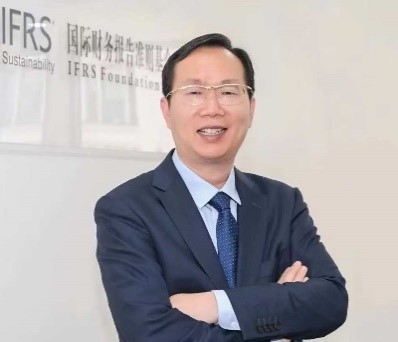
The Capacity-building Alliance of Sustainable Investment (CASI) and the International Sustainability Standards Board (ISSB) co-hosted the "Challenges and Practices in Sustainability Disclosure: A focus on Scope 3" seminar on 22 August 2024, with the combination of online and in-person seminar. The seminar invited experts from ISSB, World Resources Institute(WRI), Risk Insights, Tencent’s ESG Office, HSBC, PwC and Institute of Finance and Sustainability(IFS) to delve into the specific challenges and potential solutions encountered by stakeholders in the Scope 3 disclosure process. Nearly 200 participants from regulatory agencies, financial institutions, industry associations and academic institutions around the world engaged and participated at this seminar.


ZHANG Zhengwei, Special Advisor to the ISSB Chair & Director of Beijing Office
Zhang Zhengwei delivered an opening speech at the seminar. He expressed his pleasure to co-host this event with CASI and hoped to help companies with Scope 3 disclosures through the advanced methodologies and practical cases shared by the experts. The Beijing office of ISSB aims to promote the implementation of ISSB standards and help companies understand and apply the standards through communication, capacity building and innovative practices.

LENG Bing, Board member of the ISSB
Leng Bing then gave a keynote speech. He pointed out that the ISSB standards meet the needs of investors in the capital market and play as a global common language that is comparable and useful for decision-making. The advancement of the standards lies in the fact that each jurisdiction can add disclosure provisions that reflect its own characteristics and actual requirements based on its own actual conditions without covering up or diluting the provisions of the ISSB standards. Leng Bing further introduced the ISSB's two-year work plan in detail, including strategic partnerships with multiple institutions and advocates to jointly promote the global unification and standardization of sustainable information disclosure. For example, it will achieve full interoperability with GRI, cooperate with CDP, sign a memorandum of understanding with the Greenhouse Gas (GHG) Accounting System, actively participate in the standard update and revision of the Greenhouse Gas Accounting System, and assume the responsibility of preparing disclosure materials for the transformation plan working group.

Experts from left to right: First row: Wee Kean Fong, Director and Asia-Pacific Engagement & Director of Greenhouse Gas Protocol (GHGP) of World Resources Institute (WRI),Anushka Bogdanov, Founder and Chair of Risk Insights,Max XING, Senior Director of Tencent’s ESG Office. Second row: Ronali Perera, Director of Climate Analytics of HSBC Group Sustainability, Yvonne Kam, ISSB TIG member and PwC Partner, ZHAO Lijian, Director of Greentech Investment Center of IFS.
During the panel discussion of the seminar, the experts started from Scope 3 disclosure and shared their research perspectives and practical experience in sustainable information disclosure in light of the actual characteristics of their industries and regions.
Wee Kean Fong shared the latest progress of GHGP in developing and updating the standards. Global sustainable information disclosure is undergoing a transition from voluntary disclosure to mandatory disclosure. The process of updating and revising the GHGP standards will also be open to solicit opinions from around the world to help solve the difficulties and problems encountered by users in information disclosure.
Anushka Bogdanov mainly elaborated on the risks and opportunities of African companies in sustainable information disclosure. Although the sustainable reporting system in Africa is gradually emerging, progress is still slow. IFRS S1 and IFRS S2 standards provide a global benchmark for sustainable information disclosure, and their adoption and response rates will affect the sustainable development of companies in the medium and long term. She called on companies around the world and in Africa to consider the negative externalities of their operations on the environment, reduce these impacts through transparent sustainable reporting, and enhance value to investors.
Max XING introduced sustainable affairs promotion management structure of Tencent, which promotes Tencent's goal of achieving carbon neutrality. Scope 3 emission measurement is a long-term and constantly adjusted process. During this process, Tencent actively responds to challenges in data accuracy, data traceability availability, and supply chain emission reduction collaboration, improves the awareness of business representatives, and promotes industry-wide cooperation.
Ronali Perera emphasized HSBC's commitment in her speech. HSBC's target is set based on science-based net zero emissions reference trajectories for each industry. While these industry targets do not cover the entire value chain, some parts of them have been or will be included in other targets. In addition, she mentioned that although the methodological challenges faced in calculating financing emissions, Partnership for Carbon Accounting Finance (PCAF) provides them with guidance on calculating financing emissions and facilitation emissions on the balance sheet.
Yvonne Kam conducted a detailed case analysis on carbon emissions accounting and disclosure in the corporate value chain in the seminar, especially how to revise previous estimates in accordance with the requirements of IFRS S1 after obtaining new information when estimating information obtained in the corporate value chain. She emphasized that the ISSB standard requires that when new information is obtained and the information provides evidence of previous conditions, the company should retrospectively adjust the old data of the previous financial year and disclose the revised comparative data, stating the reasons for the revision, to ensure the accuracy and transparency of reporting.
Zhao Lijian expressed his views on common problems in scope 3 carbon accounting. He pointed out that although it is a challenge to include small and medium-sized enterprises in the scope of sustainable information disclosure, this initiative is an important part of improving carbon emissions information across the value chain. For the selection of disclosure categories in Scope 3, materiality analysis should be conducted to increase attention to important categories. A series of discussions were also conducted on the changes in accounting methods, data uniformity, and uncertainty in emission factors. He said that accounting and action are "two sides of the same coin", and companies should take the initiative to participate and set a positive example in the practical implementation of sustainable information disclosure.

CHENG Lin, Head of CASI Secretariat
At the end of the seminar, Cheng Lin concluded that he was very grateful for the opportunity to co-host this seminar with ISSB. This seminar focused on the practice and challenges of sustainable disclosure in scope 3. Through the sharing of methodologies and cases by the guests, companies enhanced their understanding and can further promote the implementation of ISSB standards. In fact, since the launch of IFRS S1 and S2, many institutions have been worried about whether it would bring additional disclosure burdens to companies in developing countries and regions, especially small and medium-sized enterprises, and how to reflect proportionality. By participating in today's event and other similar events organized by CASI, member institutions should have a clearer understanding. He also mentioned that from September 23th to 25th, CASI will hold its third In-person Capacity-building Event in Doha to delve into sustainable finance issues in the Middle East and North Africa, and launch the CASI sustainable finance course learning platform at the same time to contribute to accelerating the global low-carbon transition.

